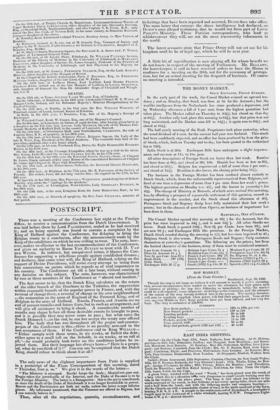POSTSCRIPT.
There was a meeting of the Conference last night at the Foreign Office, to receive a communication from the Dutch Government. It was laid before them by Lord PALMERSTON, sealed as he had received it ; and on being opened, was found to contain a complaint by the King of Holland against the Conference, for delaying to bring the Belgian treaty to a conclusion, after the announcement made by the King of the conditions on which he was willing to treat. The note, how- ever, makes no allusion to the last recommendations of the Conference, and gives no authority to Baron VON ZUYLEN to treat with M. VAN DER WF.YER. In indirect, but unequivocal terms, it blames the Con- ference for supporting a rebellious people against established thrones ; and declares, that come what will, the King of Holland, relying on the support of Divine Providence, will resist every attempt to wring from him concessions on points which be regards as of vital importance to his country. The Conference sat till a late hour, without coming to any decision on this subject. The note, however, was charactenzed by two or three members of the Conference as " absurd and insolent."
The fact seems to be, that the Dutch King calculates on the return of the elder branch of the Bourbons to the Tuileries, the suppression within reasonable bounds of the popular power in France, and, with the reversal of change there, a reversal of change in his own neighbourhood —the restoration to the arms of England of the Protocol King, and of Belgium to the arms of Holland. Russia, Prussia, and Austria see no end of present troubles and future fears, but in such an arrangement, and 'will give all assistance to bring it about. A considerable number of months may elapse before all these desirable events he brought to pass, and it is possible they may never come to pass ; but what cares the Dutch Monarch ?—in the end, he can but accept the treaty now offered him. The fault that has run throughout all the projets and counter- projets of the Conference is this—there is no penalty annexed to the non-acceptance of them. If the Conference said to King WILLIAM— "Either comply with these terms, in six weeks, or forfeit the debt; either agree to a small toll on the Scheldt, in six weeks, or no toll at all,"—he would probably look twice on the conditions before he re- jected them. But their language has always been—" Here is a propo- sal, what do you think of it ?" Can any one be surprised that the Dutch King, should refuse to think about it at all ?



























 Previous page
Previous page